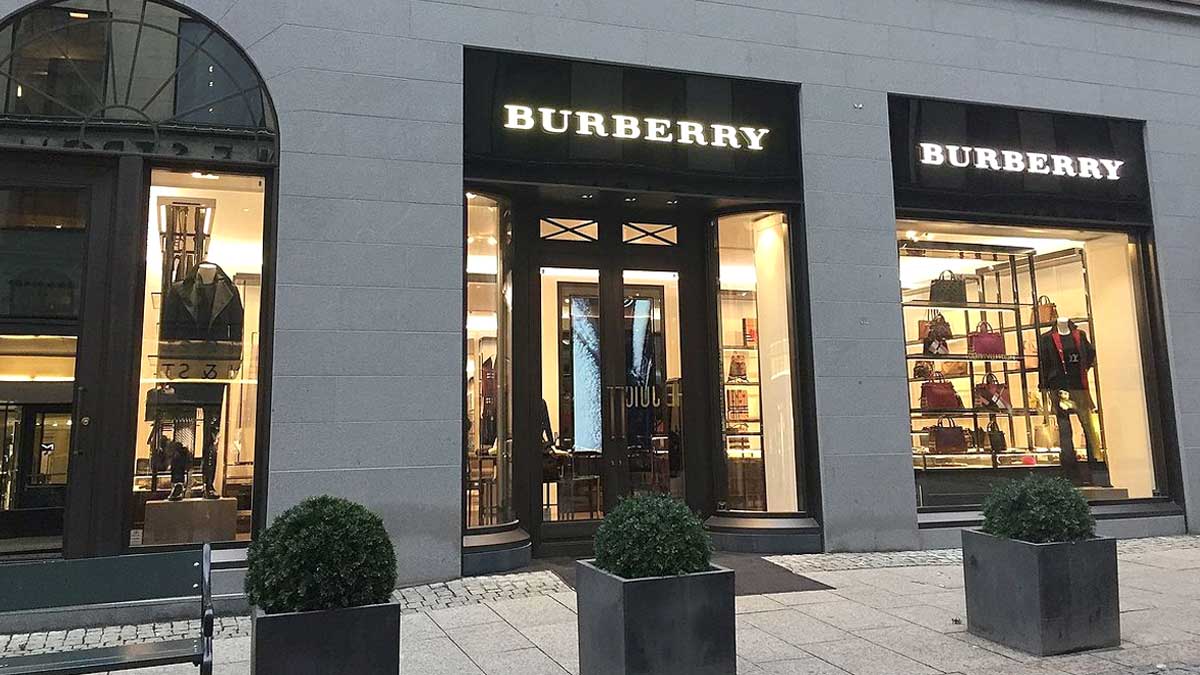- Home
- Billionaires
- Investing Newsletters
- 193CC 1000
- Article Layout 2
- Article Layout 3
- Article Layout 4
- Article Layout 5
- Article Layout 6
- Article Layout 7
- Article Layout 8
- Article Layout 9
- Article Layout 10
- Article Layout 11
- Article Layout 12
- Article Layout 13
- Article Layout 14
- Article Sidebar
- Post Format
- pages
- Archive Layouts
- Post Gallery
- Post Video Background
- Post Review
- Sponsored Post
- Leadership
- Business
- Money
- Small Business
- Innovation
- Shop
Recent Posts
Burberry Shares Plunge 16% After Profit Warning and CEO Change

Burberry’s stock plunged 16% on Monday following the announcement of a new CEO and disappointing financial results. The dramatic drop came as the British luxury fashion house revealed its second profit warning of the year, linked to a 20% decline in sales during the first quarter. This financial turbulence is compounded by a broader slowdown in the luxury market, which has been struggling with various macroeconomic pressures. Burberry’s profit has also taken a severe hit, with a staggering 40% decrease over the past year, highlighting the significant challenges the company is facing in maintaining its market position amidst a cooling luxury sector.
Jonathan Akeroyd, who had been the CEO of Burberry since April 2022, is stepping down from his position. Akeroyd, a well-respected figure in the fashion industry with prior leadership roles at Versace and Alexander McQueen, had been brought in with high expectations to navigate Burberry through a period of transformation and market challenges. However, his tenure has been marked by a notable decline in sales and profitability. Akeroyd’s departure reflects the company’s ongoing struggle to stabilize its performance and address the issues impacting its financial health.
Taking over as the new CEO is Joshua Schulman, who represents the fourth leader for Burberry in the last decade. Schulman, who previously served as CEO of Michael Kors, Coach, and Jimmy Choo, is recognized for his extensive experience in the luxury fashion industry. His notable achievement includes revitalizing Coach during his leadership from 2017 to 2020, which is seen as a key asset for his new role at Burberry. Schulman is set to begin his position on Wednesday with a reported annual salary of $1.56 million. His initial focus will be on implementing cost-cutting strategies and rebranding efforts designed to broaden Burberry’s market appeal by introducing more accessible, everyday product offerings.
Burberry’s challenges are not new but part of a prolonged period of underperformance over the past five years. The brand has struggled to maintain its core identity while adapting to shifting market demands. In 2022, Riccardo Tisci, the chief creative officer at the time, left after a five-year tenure that saw the introduction of a streetwear aesthetic. This shift, while aiming to modernize the brand, was criticized for straying too far from Burberry’s traditional style. Daniel Lee, who succeeded Tisci, attempted to reconnect the brand with its British heritage but faced backlash over his collections, which critics argued lacked clear direction and coherence.
The broader luxury fashion market has been facing slower growth since 2023, driven by macroeconomic instability, geopolitical uncertainties, and a decline in brand loyalty and consumer engagement. While many brands are grappling with these issues, Miu Miu has emerged as an exception with a remarkable 90% growth in the first quarter, credited to its successful engagement with Gen Z consumers. This stands in stark contrast to Burberry’s ongoing struggles and highlights the difficulties faced by established brands in adapting to evolving market dynamics.
In response to its financial difficulties, Burberry has announced a potential reduction of 400 jobs, primarily within its UK offices. This move is part of the company’s broader effort to streamline operations and reduce costs as it navigates through its financial challenges. The potential job cuts underscore the severity of Burberry’s situation and the urgency of implementing effective measures to stabilize the company.
Joshua Schulman’s previous appointment to become CEO of Capri Holdings, the parent company of Versace, Jimmy Choo, and Michael Kors, was set to start in 2021 but was cut short. His departure from Capri Holdings just months before assuming the role positioned him for the opportunity to lead Burberry through its current period of difficulty. As Schulman takes over, he will need to address the numerous challenges facing the brand and implement strategies to restore its financial health and market standing.
In summary, Burberry’s significant share drop, the leadership change, and ongoing financial struggles paint a picture of a brand in transition. As Joshua Schulman steps into his new role, the fashion industry and investors will be closely watching his efforts to rejuvenate Burberry and tackle the pressing issues that have plagued the brand in recent years.
Recent Posts
Categories
- 193cc Digital Assets2
- 5G1
- Aerospace & Defense46
- AI37
- Arts3
- Banking & Insurance11
- Big Data3
- Billionaires449
- Boats & Planes1
- Business328
- Careers13
- Cars & Bikes76
- CEO Network1
- CFO Network17
- CHRO Network1
- CIO Network1
- Cloud10
- CMO Network18
- Commercial Real Estate7
- Consultant1
- Consumer Tech180
- CxO1
- Cybersecurity68
- Dining1
- Diversity, Equity & Inclusion4
- Education7
- Energy8
- Enterprise Tech29
- Events11
- Fintech1
- Food & Drink2
- Franchises1
- Freelance1
- Future Of Work2
- Games141
- GIG1
- Healthcare78
- Hollywood & Entertainment186
- Houses1
- Innovation42
- Investing2
- Investing Newsletters4
- Leadership65
- Lifestyle11
- Manufacturing1
- Markets20
- Media193
- Mobile phone1
- Money13
- Personal Finance2
- Policy567
- Real Estate1
- Research6
- Retail1
- Retirement1
- Small Business1
- SportsMoney33
- Style & Beauty1
- Success Income1
- Taxes2
- Travel10
- Uncategorized8
- Vices1
- Watches & Jewelry2
- world's billionaires418
Related Articles
Tesla Recalls 700,000 Vehicles Over Tire Pressure Issue
Tesla has announced its latest recall of nearly 700,000 vehicles in the...
By 193cc Agency CouncilDecember 20, 2024MicroStrategy Stock Rallies on Nasdaq 100 News
Shares of MicroStrategy surged on Monday following the announcement that the company...
By 193cc Agency CouncilDecember 16, 2024Stanley Recalls Millions of Mugs After Burn Injuries
In a significant recall, Stanley, the well-known brand behind popular stainless steel...
By 193cc Agency CouncilDecember 12, 2024Adobe Shares Drop 12% After Lowering Revenue Outlook
Shares of Adobe experienced a significant drop of over 12% on Thursday,...
By 193cc Agency CouncilDecember 12, 2024















Leave a comment